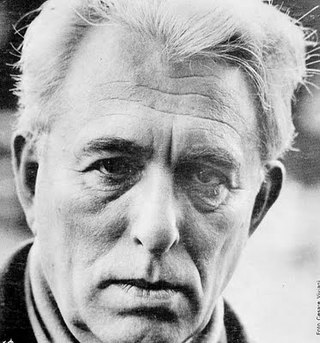
Vittorio Gassman, popularly known as Il Mattatore, was an Italian actor, director, and screenwriter.

Marco Ferreri was an Italian film director, screenwriter and actor, who began his career in the 1950s directing three films in Spain, followed by 24 Italian films before his death in 1997. He is considered one of the greatest European cinematic provocateurs of his time and had a constant presence in prestigious festival circuit - including eight films in competition in Cannes Film Festival and a Golden Bear win in 1991 Berlin Film Festival. Three of his films are among 100 films selected for preservation for significant contribution to Italian cinema.

Francesco Rosi was an Italian film director. His film The Mattei Affair won the Palme d'Or at the 1972 Cannes Film Festival. Rosi's films, especially those of the 1960s and 1970s, often appeared to have political messages. While the topics of his later films became less politically oriented and more angled toward literature, he continued to direct until 1997, his last film being the adaptation of Primo Levi's book, The Truce.

Carlo Ludovico Bragaglia was an Italian film director whose career spanned from the 1930s to the mid-1960s. He mainly directed adventure pictures and popular comedies, including some starring Totò. His 1942 film Non ti pago! was shown as part of a retrospective on Italian comedy at the 67th Venice International Film Festival.

Riccardo Garrone was an Italian actor and dubber.

Paolo Bonolis is an Italian television host. He made his debut in 1981 on 3, 2, 1... contatto!, a programme for children that aired on Italian national broadcaster RAI.

Pietro Ghislandi is an Italian actor.

Franco Fortini was the pseudonym of Franco Lattes, an Italian poet, writer, translator, essayist, literary critic and Marxist intellectual.

Loretta Goggi is an Italian singer, actress, and television presenter. Goggi's records have sometimes entered the Italian pop charts. She was the first runner-up at the 1981 Sanremo Festival with the song "Maledetta primavera", her most famous pop hit.

Carlo Natale Marino Conti, simply known as Carlo Conti, is an Italian television presenter.

Fanny Cadeo is an Italian actress, television personality, singer, and model. Cadeo was born in Lavagna and studied acting with Beatrice Bracco. She achieved her first success in 1992 when she was one of the first showgirls to appear in Striscia la notizia and remained with the show until 1994. Since 2013, she has been the presenter of the Rai Due television show Il Cercasapori.

Stadio is an Italian pop rock band formed in 1977. The members are Giovanni Pezzoli (drums), Roberto Drovandi, Andrea Fornili (guitar), and Gaetano Curreri.
This is a list of Italian television related events from 1959.
This is a list of Italian television related events from 1972.
This is a list of Italian television related events from 1977.
This is a list of Italian television related events from 1969.
This is a list of Italian television related events from 1998.

Ludovica Modugno was an Italian actress who specialized in dubbing.

Fabrizio Maturani, known as Martufello, is an Italian comedian, cabaret artist, humorist and actor..
Aurora Giovinazzo is an Italian actress.













